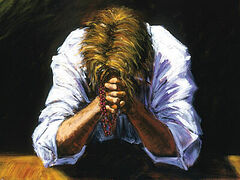“A Christian’s earthly life is dissolved in consolations and temptations. Divine Providence has arranged it so! Consolations support us on the path of God, and temptations make us wise,” wrote St. Ignatius (Brianchaninov). Modern man is so used to receiving consolation that he almost does not know how to bear temptation. He always seeks for his own, he gets annoyed and angry, and he is very busy all the time. He is too busy to stop, to pray and speak to the Creator: he has more important things to do than commune with God. But once trials begin, he gives up everything and strenuously asks for help from the Lord. We perceive Him as a Fulfiller of our immediate needs. Isn’t this the main problem of modern man? We talked about this with Archpriest Alexander Berezovsky, a priest of the Church of the Annunciation of the Most Holy Theotokos in Petrovsky Park, Moscow.
 —Father Alexander, modern people are weak, impatient and irritable. A person who embarks on his journey to the Church, to the Lord, wants to achieve everything at once and get straight to the “university”, skipping the whole “elementary school course”. He first takes on some incredible ascetic labors, extremely long prayer rules, and makes hundreds of prostrations, but he burns out very quickly since he has no foundation, and his love for God grows cold. Do you see this as a problem? Do modern people have it?
—Father Alexander, modern people are weak, impatient and irritable. A person who embarks on his journey to the Church, to the Lord, wants to achieve everything at once and get straight to the “university”, skipping the whole “elementary school course”. He first takes on some incredible ascetic labors, extremely long prayer rules, and makes hundreds of prostrations, but he burns out very quickly since he has no foundation, and his love for God grows cold. Do you see this as a problem? Do modern people have it?
—It does happen, but not to everyone. Some walk this path gradually. Many people have lived in the Church since childhood, especially nowadays, when many parents are church-goers and try to raise their children in the faith from an early age. When it comes to young people, the problem here is that as children they were taken to church, but later, having reached a certain age, they grew cold to what had been given to them through their parents. Of those who came to God quickly and very actively some stay in the Church, and others burn out and grow cold, because they cannot cope with the feat that they took on themselves. There is such a problem: it boils down to a lack of spiritual guidance. Previously, people always had spiritual fathers in the Church, with whom they consulted, shared their serious problems and from whom they received thoughtful spiritual advice, following which they took their paths in life. Unfortunately, now this practice no longer exists. Although many people have, as they say, “father-confessors”, but still there is no spiritual guidance. In our days “father-confessors” are often priests who simply hear confessions and who know little about these people, about their families and lives. So people have to try what they have read and heard somewhere to their taste. Hence such mistakes. But true seekers will surely be brought by God to the truth. Seek, and ye shall find, the Lord said (Lk. 11:9). If someone seeks the truth—not his own, but God’s—he will receive it.
—As I see it, there is another problem in spiritual guidance. I can say this about myself. When I repent at confession and say what sins I have committed over the week, I must listen carefully to what God tells me through my father-confessor or just a priest who hears my confession. But very often it happens that when we listen, we don’t hear. Unfortunately, what I was told how to deal with one or another passion remains only words. I listen, but don’t do it. This is also a typical story for modern man.
—The is because priests mostly give people ordinary advice at confessions. A person has already heard it many times: to be patient, not to hurry, to pray to God. A person thinks that he already has patience, prays and makes efforts, but does not see any tangible results from what he was advised to do. You are right that many people want to see spiritual fruits quickly, so they are unwilling to walk step-by-step with patience. Many have already lived most of their lives—people often begin to integrate Church life when they are in their fifties. They want to have time to succeed, so they hurry to read and listen to spiritual things. Many even take theological courses in order to get to know the Holy Scriptures, the Holy Tradition and Church life better.
—Then this is a question to the priest who should give more specific advice and understand exactly what to say to his spiritual child.
—Sometimes a priest really has no time. Someone comes to confession on a great feast and there is a line of fifty-sixty people in church. A priest has to hear everyone’s confessions in order to give them Communion. There is only time for a short confession, and this is sometimes not enough. It is better to come on a weekday evening if you want a full confession, a real conversation and advice. People can also be busy, and for one ord another reason cannot come on weekdays. But those who really need it come and have long spiritual conversations. But again, in spiritual life you should be patient. Not everything is done quickly, and not everything is given and revealed quickly. People often lack patience, especially if there is a long-standing problem. But a person wants some recipe that will start working today, and changes in life right away. When he is offered a long path, it is more difficult for him. Especially if relations with his loved ones are destroyed, it takes a long time to sort things out. You can’t sit down, talk just in one evening, and solve all the problems. No, people hold grievances in their souls for a long time, and sometimes it takes years to heal them. Today people are so impatient.
There is also the following problem: People are not seeking God, but solutions to their problems. But since these problems are partly outward and partly inward, they go to Church and sometimes ask the priest questions that are not part of his competence. But people wait for advice to solve their problems. Priests always try to turn a conversation into the sphere of a person’s relationship with God. And here priests find that people do not need it. Someone has come for a solution to his problem, not for spiritual advice, still less for a relationship with God. There are few people who come and ask a priest: “Father, what should I do to enter the Heavenly Kingdom?” We hear such a question only in the Gospel from a young man who came to Christ, but in real life such questions are extremely rare.
—Do you have a feeling that there is a lot of theory in a large amount of literature in church shops and bookstores, but little practice? After all, referring to your words, if you come to confession and mention the same sin over and again, listen to the priest’s advice, but do nothing, is there any sense in what you have read? It appears that you just wasted your time. You haven’t taken what you read in the book into your heart and soul, and haven’t reformed.
—We don’t know what happens in someone’s soul after confession. Something probably remains in his heart, and he cares about how he will live after confession. His conscience denounces him and says: “You repented, you promised God!” The priest will sometimes remind him that he has grieved God with the same sin again, thereby awakening his conscience. But we cannot say whether a person is making efforts to reform or not. If he repents repeatedly of what he committed, it does not mean that he has not been making efforts. He may have tried his best, but so far his efforts have not yet yielded the desired results. He fell again and came to ask for God’s help again. I personally never suspect people of insincerity at confession, even if their confessions are concise or brief. Maybe it’s more convenient for them. A lengthy confession as opposed to a short confession is not evidence of sincerity. God alone knows what is in their hearts at this moment.
—Father Alexander, do you agree that there is a great difference between repentance and confession, between mentioning a sin, getting over it, and weeping over it?
—No, there is no difference. Confession is an integral part of repentance. After confession, the passions that lead you to sin become weaker, and it is easier for you to fight them. Later they get stronger again, and you come to confession again. When repenting of a sin, confession can be required several times. You don’t necessarily repent once and then reform. Repentance is broader than just confession.
—But we very often just confess and do not repent sincerely. After all, if we sincerely wanted to eliminate the sin of irritability or anger in ourselves, the next time we wanted to say something rude in response to an irritating factor we would restrain ourselves. But we still say rude words…
—In theory we should control all our words, thoughts and actions. But we don’t have the habit of controlling them. It is acquired by many years of work. Even after entering a monastery, people do not get rid of their worldly passions quickly. Maybe they repent sincerely, confess their sins, pray for the deliverance of these passions every day and lead rather austere lives, but all this does not happen immediately. Sometimes God wants us to struggle for a certain period of time and He does not deliver us from the sin that we ask Him to free us from so that we should not relax and fall into some other sin.
To be continued…





